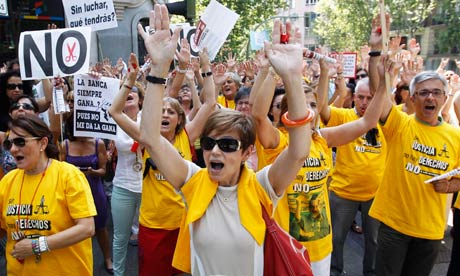Spain's cost of borrowing hits record high as Germany approves potential bond-buying with leftovers from €100bn banks bailout

Spanish civil servants protest against
government austerity measures in front of the headquarters of the
governing People's party.
Protesters took to the streets of 80 Spanish cities on Thursday night after prime minister Mariano Rajoy's People's party (PP) pushed a €65bn (£51bn) austerity package through parliament and the country paid record prices to borrow money from sceptical markets.
More than 100,000 people were estimated to have joined in demonstrations called by trades unions, with about 50,000 gathering in Madrid. Police fired rubber bullets to disperse the protesters in Madrid.
Angry civil servants had blocked traffic in several main Madrid avenues earlier in the day, with protesters puncturing the tyres of dozens of riot police vans, amid growing upset at austerity, recession and 24% unemployment.
Rajoy was able to get the measures through parliament comfortably, using only the votes of PP MPs.
The finance minister, Cristóbal Montoro, who warned on Wednesday there was no money for civil service wages, said Spain could not go deeper into debt. "Financing public services with more deficit and more debt will doom us," he said.
Proof of Spain's growing financing problems came when it paid a record interest rate of 6.459% to sell five-year bonds, while rates on 10-year bonds rose back above the unsustainable 7% level.
France paid less than 1% for similar five-year bonds as investors shunned southern economies for what they saw as the eurozone's safer core.
A bailout for Spain's ailing banks was approved in a key vote by the German parliament, though a last-minute surprise in the package saw a move towards enabling potential bond-buying with leftover money from the €100bn on offer.
Officials in Brussels and Madrid insisted that bond-buying and bank bailouts were not connected, even though they appeared in a bailout document released on Thursday.
"The aid programme for bank recapitalisation is destined only for that and not for the purchase of bonds on the primary or secondary markets," a Spanish government source said.
European commission spokesman Simon O'Connor said: "There is no link between assistance for bank recapitalisation in Spain and any other type of financial assistance, which might be requested at some further juncture by Spain or anybody else."
But a draft European financial stability facility (EFSF) bailout contract published by the German parliament lays out the conditions by which Spain might request the funds to buy bonds with money currently earmarked only for banks.
Madrid would have to formally ask eurozone finance ministers for their agreement and then renegotiate the memorandum of understanding as specific terms for that aid were drawn up.
"What Spain and the market need is some reassurance on the eurozone agreement that the Spanish state would not be responsible for the bank bailout," said Luis Garicano of the London School of Economics. "Leaving the door confusingly ajar as to a larger rescue does not help Spain, whose financial needs would anyway be much larger."
Germany's finance ministry said Spain would need €300bn in "European refinancing funds" between now and the end of 2014 if cut out of the bond markets.
The bailout, which offers up to €100bn to Spanish banks bloated with toxic real estate assets, is due to be signed on Friday. Banks are expected to request €65bn of that loan, leaving about €35bn.
The German finance minister, Wolfgang Schäuble, insisted that Madrid remained liable for the bailout money – despite eurozone plans to eventually move that liability directly to the banks.
He warned German MPs the slightest perceived risk of Spanish insolvency could trip up the entire 17-nation eurozone.
"We have a strong interest in helping Spain continue with its fundamental economic reforms," he said. "It can only work if the problems in the banking sector are solved. It's a matter of breaking a vicious circle."
His department, in a separate document, stressed that last month's EU summit agreed, "unmistakably at German insistence", there could only be direct aid to banks once a new European banking supervisory authority was operating.
"Supervision on paper is not enough for that. It must be properly established and functioning. The initiative corresponds to the German demand that control and liability are inseparable," it said. "These conditions do not apply in the current case of Spain."
No comments:
Post a Comment